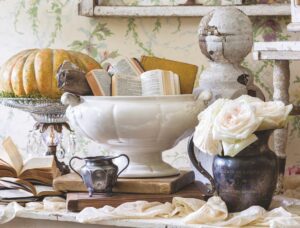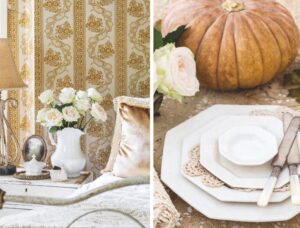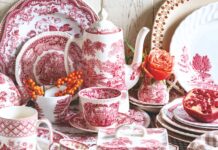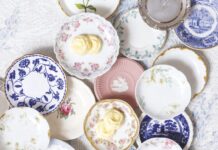 Ironstone pottery, once a cost-effective alternative to porcelain, is having a bit of a heyday. Perusing the dazzling array of pieces carefully curated by enthusiasts, it’s hard to imagine that the pristine pottery had humble beginnings. From plate sets to pitchers, the all-white dishes have become enduring favorites for collectors and decorators alike.
Ironstone pottery, once a cost-effective alternative to porcelain, is having a bit of a heyday. Perusing the dazzling array of pieces carefully curated by enthusiasts, it’s hard to imagine that the pristine pottery had humble beginnings. From plate sets to pitchers, the all-white dishes have become enduring favorites for collectors and decorators alike.

A Brief History of Ironstone
Ironstone’s rise to the role of beloved heirloom began in the industrial boom of the 19th century. Charles James Mason of Staffordshire, England, acquired a patent for a new type of pottery that would be less fragile than preexisting ceramics. In contrast to porcelain, ironstone is less prone to chipping and shattering when used for daily meals.

After the patent expired, other European manufacturers took up fabricating ironstone, exporting much of it to the United States. Upon arrival in America, ironstone often gained popularity based on themes. Farm communities treasured dishes printed with agricultural imagery, which became known as “thrashers’ ware.”
Earning its name not from the composition but from its robustness, ironstone perfectly suited lavish Victorian dining rituals. The material became a new favorite with all levels of society, thanks to its blend of durability with affordability.

What Do Collectors Look For?
Although many dishes are embellished with vivid transfer designs, the plainest variety of ironstone remains perennially popular. “Its simplicity brightens and enlivens the surroundings in which it is used,” says Adele Armbruster, president of the White Ironstone China Association. The ivory hue serves as a perfect blank canvas for decorating year-round, matching any seasonal décor. Try displaying pieces like a backdrop on a shelf or incorporated them into tablescapes.
Jim Kerr of Cavern View Antiques in Howes Cave, New York, a fellow member of the association, agrees with Adele that white is high on the wishlist. But other factors are at play when enthusiasts seek out new pieces. “In the past, many collectors concentrated on one particular shape in order to accumulate a set. Today, having a variety of shapes seems to be more the norm,” he says.
The real pleasure of collecting ironstone comes from the hunt, as more people discover the exhilaration of coming across a spotless white cake stand, bowl, or pitcher. As with any cache of vintage treasures, find what appeals to you. “Ironstone collecting is a personal thing,” Adele says. “What one person gets excited about could be entirely different than another person’s interests.”
Text by Kate Lorio
Discover alluring collectibles, inspiring style ideas, and more by ordering your Southern Lady print subscription and digital subscription today!





